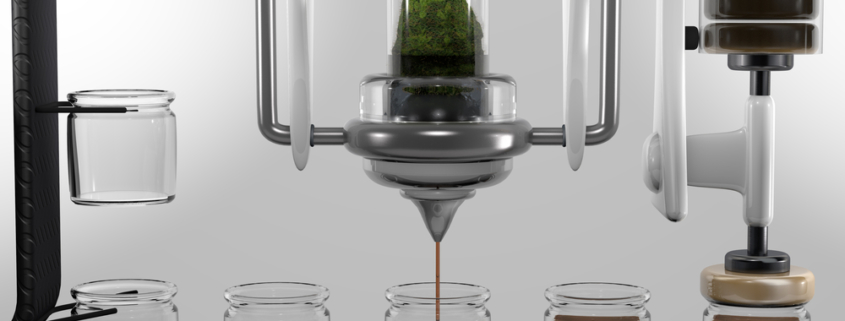Since hemp was legalized, our methods and technologies for processing cannabinoids have grown increasingly sophisticated. Today, hemp extraction operations borrow equipment and Good Manufacturing Practices (GMP) from the pharmaceutical and food processing industries. In turn, hemp companies produce pure extracts that provide accurate and consistent CBD dosing.
Hemp farmers and manufacturers have a number of options to choose from when it comes to hemp extraction equipment. Generally speaking, your decisions on purchasing hemp extraction equipment will be dictated by your business goals and budgetary constraints.
To get a clearer picture of the technology that goes into making quality CBD products, let’s explore the topic of hemp extraction equipment in more detail.
CBD Extraction Machines
Hemp extraction equipment plays a critical role in getting CBD products to market. In essence, extraction technology utilizes solvents to isolate CBD and terpenes from excess plant materials. Solvents are defined as, “liquid substance[s] capable of dissolving or dispersing one or more other substances.”
CBD extraction equipment generally uses one, or a combination of, the following solvents: carbon dioxide (CO2), ethanol (alcohol), and hydrocarbons (butane and propane).
CBD Product Supply Chain
Today, CBD oil extraction machines play a critical role in the CBD product supply chain. Without such pieces of technology as supercritical CO2 extractors, you would not be able to make many of the CBD products seen on the market today.
CBD extraction machines are responsible for taking raw plant material and removing valuable terpenes and cannabinoids. After these “extracts” are isolated from excess plant material, they are then infused in CBD products like gummies, salves, and drinks.
Hemp extraction technology is generally owned and operated by vertically integrated producers or manufacturers who purchase raw hemp biomass. In either case, this technology links a critical step between hemp farmers and CBD consumers.
Choosing Hemp Extraction Equipment: Factors to Consider
There are several factors that drive good decision-making when purchasing a hemp extraction system. Not only must you consider the budget, but you must also keep your target audience in mind. In the end, different extraction technologies will deliver different hemp CBD products.
Extraction equipment that can handle the rigors of commercial CBD product manufacturing is not cheap. While different extraction technologies are available for both small producers and large operations, commercial equipment is needed to process large crops. Commercial-grade hydrocarbon extractors can cost up to $200,000, while similarly sized supercritical CO2 extractors run upwards of $500,000.
Understanding exactly what your end CBD product will be can also serve as a great guide for choosing the right extraction equipment. For example, if product purity is a part of your brand identity, CO2 extraction is likely a better option than hydrocarbon extraction. Namely because you can mention the fact you don’t use any noxious solvents in making your CBD products.
Hydrocarbon CBD Extraction Equipment
Hydrocarbon hemp extraction equipment utilizes hydrocarbon solvents such as butane and propane to isolate CBD from other hemp plant materials. Due to the fact that both butane and propane are highly volatile, hydrocarbon extractors are engineered with very specific safety protocols in mind.
Closed-loop extraction technology is the industry standard for hydrocarbon extracts in the modern hemp industry. This hydrocarbon hemp extraction equipment is referred to as “closed-loop” because it never allows the solvents to make contact with the open air. As such, it greatly reduces the risk of working with highly volatile hydrocarbons.
Hydrocarbon extractor manufacturers have developed extremely sophisticated ways to purge these extracts of all residual solvents. Many popular cannabinoid extracts are made via hydrocarbon extraction, including wax, shatter, and crumble.
Ethanol Hemp Extraction Equipment
Ethanol hemp extraction equipment uses alcohol as a solvent to extract CBD and other valuable cannabinoids and terpenes. While hydrocarbon extracts can be safely purged of residual solvents, certain people remain skeptical about consuming them. As such, ethanol offers a “cleaner” alternative to hydrocarbon extracts for particular consumer demographics.
Like other extraction methods, ethanol extractors bring hemp plant materials down to extremely cold temperatures while soaking them in the solvent. The extract is then filtered and purged of excess ethanol. Occasionally, manufacturers will take the process one step further and isolate a specific cannabinoid like CBD or THC from the extract.
CBD companies enjoy ethanol extraction because it is easily scalable and can be used to make a wide variety of products. Because ethanol extraction works at different temperatures, it gives extraction teams more options over what they are extracting. Colder extractions are better for isolating more specific cannabinoids and terpenes, while warmer ethanol extractions pull a “wider spectrum of terpenes as well as other water-soluble compounds.”
CO2 (Carbon Dioxide) CBD Extraction Equipment
With the advent of legalization, hemp companies have been able to look to other industries in developing new extraction methods. To this end, carbon dioxide (CO2) extraction technology has largely been adopted from food manufacturers. For example, CO2 extraction is a popular practice for isolating flavors from organic compounds and then infusing them in other products.
While ethanol extraction is often believed to be cleaner than hydrocarbon extraction, CO2 extraction is the cleanest of them all. Many CBD producers have turned to CO2 extraction because it does not utilize volatile compounds that could harm the human body or the environment.
As extraction experts suggest, CO2 “has been widely used [for CBD extraction] since it is abundant, inexpensive, non-toxic, non-flammable, relatively chemically inert, and forms at almost room temperature.” While CO2 extraction is immensely popular in the hemp industry, some manufacturers have turned away from this technology due to its high overhead cost.
Summary
Hemp product manufacturing continues to grow more sophisticated with increasingly sophisticated consumer demand. In the hemp industry of today, very few products even resemble the CBD flowers from which they are originally sourced. The process of taking raw plant material and turning it into edibles, topicals, and vapes is dependent on very specific technologies.
The CBD industry as we know it today would not be possible without hemp extraction equipment. All things considered, this technology is a critical link in the CBD supply chain. While your specific extractor needs will vary with the size and scope of your operation, you need the right equipment to build a successful CBD brand.
Contact High Grade Hemp Seed
High Grade Hemp Seed works with commercial hemp farmers and CBD product manufacturers on a daily basis. Please contact us with additional questions about CBD hemp or hemp extraction technology.



